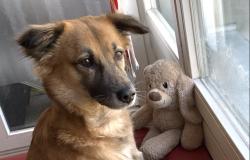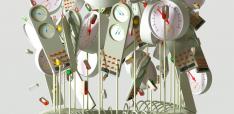Research with and for our more-than-human families

In Memoriam - Donny Bhawalkar Narlikar aka #VeryGoodBoy
Dear friends and supporters,
Many of you have wished Don and me well over the years. So I share this tragic news with you today because I realize that some of you might want to know.
Donny passed away, recently and peacefully, due to old age. He was 14 years old. The vet tries to offer us solace: even though he did not look it, he was almost 100 years old in human years. At least no long illness had tormented him. His fur shone, his eyes were bright even on the day of his passing, all his teeth were perfect. Just a fortnight before, strangers passing us on our walkie had commented on the “ganz schöner Hund” by my side. For all this, I am grateful, even in this time of overwhelming grief.
Donny came from India, where he had had a very tough childhood and youth – trials that he had borne with the same dignity and gentleness that he showed throughout his life. When I moved to Germany from England, I swore I would bring him over, or I would move back to India (life without him was no longer conceivable for me). Many wonderful people, on both the Indian and German sides, were involved in ProjectUniteDonnyAmrita, and to whom we will always be indebted.
The boundless joy and laughter that Don brought was the perfect antidote to the demands of my stressful work life, in a country that was foreign to both of us. The walkies together were a refreshing distraction from everything else. Whenever I was ill, he would sit at my feet, sighing gently to express his sympathy and support. When I would return from a business trip, he would come running to the door and try to carry my luggage for me; finding himself unable to help on this front as the bags were too heavy, he would then bring me his treats as a welcome-home food offering.
Food was an issue. Having suffered through near starvation in his early years, Donny had decided that he was no longer interested in food. The only way I was able to get him (somewhat) engaged with food again was by feeding him with a spoon, expanding the variety of food types, and singing silly multi-lingual songs that I would “compose” for him. His mealtimes became cherished moments – among the best times of the day for both of us.
To remain an active researcher, while also doing a demanding job in academic leadership (as an outsider in Germany), required me to work through most nights. But my tiredness would disappear when a bundle of red-gold fur, rolling and wriggling on the floor, would invite me for some playtime at 1am in the morning. When I would occasionally doze off reading in the middle of the night, I would wake up to find that he had drawn his blanket over me.
He seldom barked. In fact, about once/twice a year, he would let out a couple of low-pitched, deep, rumbling woofs, as he sat in the window observing the world – and not because we trained him not to bark, but because that is how he liked it. He had other forms of vocal articulation, almost attempts at speech to imitate us. Then there were the high-pitched shrieks of unadulterated ecstasy when he saw me coming home from the window or the balcony. Oh, and he sang the sweetest notes. When my mother would teach me tunes from Hindustani classical music, he would join in as a pupil. He would do this sitting in his classic, front-legs-crossed position, with an extremely serious face rapt in deep concentration, and hum along with us. It was impossible not to burst out laughing – and that would be the end of the lesson.
I admired him for his independent spirit. Things that he did not want to do, we could not usually get him to do. My mother was the first to insist that she wanted to “listen” to him rather than just order him about (and contra what the trainer had asked us to do). Rather quickly, my father and I followed suit. We tried to respect his preferences and wishes, and he rewarded us many times over with his trust, love, and empathy.
He was always polite and helpful outside, except when he felt danger was imminent. In those cases, he would utter a menacing, warning growl – this would suffice to keep those with ill-intent away from us. People would comment on his elegant pony-like walk, his ears that would bounce rhythmically which each step, his beautiful eyes, the glow of his honey-coloured fur. He was oblivious to all this admiration. And yet, his chest would be puffed out, his head held high, and his tail curled up simply because he was so proud to be taking his person/ people out on a walk.
Inside, with us, he was a magical mix of silliness and giggles. He was wise. He had a clear sense of morality and judgement. He had a wicked sense of humor. He was extremely clean – I used to joke that he was more like a cat than a dog. Despite being such a #VeryGoodBoy, his independent personality meant that he was never boring.
Much that is good in me today comes from my handsome boy. He taught me empathy for all beings. My research agenda changed and evolved after getting to know him. The high research productivity that I was able to sustain over the last years was almost entirely because of him. I loved him, not only as my “pet”, but for the very special individual that he was.
I am very grateful for the years we had together, including the last few weeks. I am happy that my 2-page interview with Der Tagesspiegel (English version in Global Policy) was published this July (with a photograph of the two of us together, in my office), and I was able to tell Donny how he had gotten animal rights onto my research agenda. I am so glad that I was able to announce in late July that I planned to step down from the GIGA Presidency – something that I had wanted (and tried) to do earlier but had delayed on request. On the evening of the announcement, Donny and I had danced together with joy. And even on his last day with us, my sweet, considerate boy found new ways to make us smile.
Don was my protector, my teacher, my best friend, my equal. I miss him greatly and am overcome with sorrow. But I know he would not want me to be sad. A wise friend re-introduced me to the verse below, and for the first time, amidst this heart-breaking loss, its meaning has become clearer to me. The verse reminds us that we are all a part of the divine consciousness. Even if a part is subtracted from the whole, the completeness remains; Don and I are inseparable.
ॐ पूर्णमदः पूर्णमिदं पूर्णात्पूर्णमुदच्यते ।
पूर्णस्य पूर्णमादाय पूर्णमेवावशिष्यते ॥
ॐ शान्तिः शान्तिः शान्तिः ॥
Our anthropocentric perspectives often lead us to recognize the humans in our families and social/ work circles who shape us (both as researchers and as people). But the role that our more-than-human family play is either forgotten, or public recognition of this is consciously and painfully avoided for risk of ridicule. So I am very thankful to Dr Eva Nag for her willingness to carry this piece in Global Policy.
Thank you, dearest Donny. You were and are a part of the divine consciousness. How blessed am I, as are all those whose lives you have touched with your immense power, sweetness, and grace.
Image: copyright Amrita Narlikar

